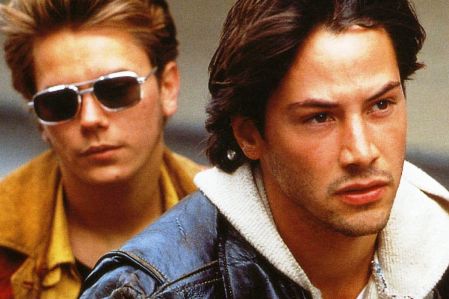 Gus Van Sant’s 1991 film portrays the difficult yet tender world of runaways.
Gus Van Sant’s 1991 film portrays the difficult yet tender world of runaways.
One of my favorite working American directors is Gus Van Sant. His adventurous style was evident in his early films, of which one of the finest is his 1991 effort, My Own Private Idaho.
In My Own Private Idaho, the late River Phoenix plays Mike Waters, a young street hustler wandering through the Pacific Northwest, who is subject to fits of narcolepsy. He tends to conk out whenever things get too difficult and stressful, and in his dream states we see images of his childhood and long-lost mother. He gets picked up by a Portland woman who takes him to her house, where it turns out there are already two other male prostitutes. Mike has one of his sleeping fits there, and is carried out in his helpless state by one of the hustlers, Scott Favor, played by Keanu Reeves. They become friends, and Scott introduces him to other denizens of Portland’s skid row.
Van Sant is most interested in evoking feeling states through visual style, and only secondarily in narrative. This film is about what it feels like to be a drifter, surviving from day to day, hanging out in diners and flophouses, smoking, talking aimlessly. Narcolepsy, which has its own drifting quality, is a perfect thematic device for this picture. The travels of the two main characters are punctuated with large, unexplained gaps: they just show up in places somehow. There’s a constant sense of sadness and disconnection here, but also a sort of devil-may-care sense of humor, the humor of young adventurers with nothing to lose.
We discover eventually, in a casual way, that Scott comes from a rich family. Here is injected the motif, from Shakespeare’s Henry IV, of the profligate young Prince Hal (namely, Scott) and the older man Falstaff, both mentor and victim—in this case an old, overweight gay drifter named Bob, played by William Reichert, proud in his way but perpetually in need of money, the hope for which forms part of his attachment to Scott. Van Sant even incorporates some of the actual lines from Shakespeare’s play, and he’s in such control here that this doesn’t seem awkward at all. Throughout the picture, he aims for stylized poetic expression rather than realism, so the Prince Hal theme ends up fitting right in.
Keanu Reeves is required to play a self-centered character who resists vulnerability, and since that’s within his range, he does well. Phoenix’s character, however, is really the heart of the film—it’s impossible to imagine another actor who could’ve portrayed this figure of lost, wounded innocence and make it convincing, as he does. Among the film’s scattered journeys, the quest for Mike’s mother carries the central meaning. The child’s overpowering need for love and home is the one underlying fact, the key thread in this wistful, ragged tapestry of a movie.
An elegy for youthful wanderers, My Own Private Idaho is available on DVD.

The fictional account of a Chinese opera troupe covers, in epic and satiric style, the course of Chinese history from the 1920s through the...

The film version of August Wilson’s play about a jazz recording session in 1927 features Viola Davis in the title role, and Chadwick Boseman...

This 1959 film starring Audrey Hepburn is a rare example of Hollywood taking the rigors and struggles of religious faith seriously. Religious stories go...